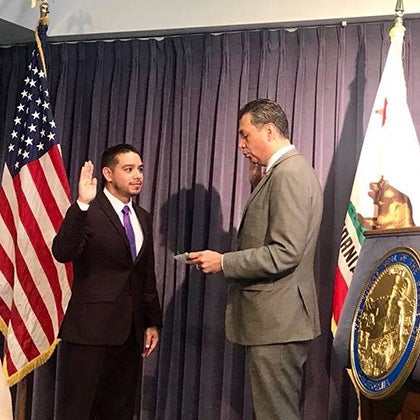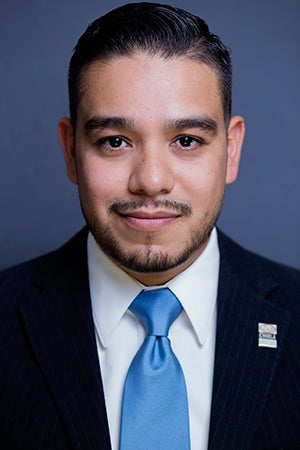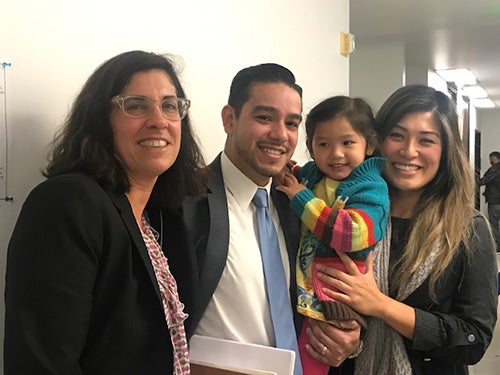Immigration inspiration: UCLA Law alumnus Luis Perez wins long fight for residency
Attorney who specializes in immigration was law school’s first graduate who was undocumented
This article was originally published on the UCLA Newsroom website on April 17, 2018. We share it here with UCLA Newsroom's permission.
Immigration inspiration: UCLA Law alumnus Luis Perez wins long fight for residency
by Joshua Rich

On Feb. 1, California Secretary of State Alex Padilla raised his right hand to personally swear in the newest member of the state bar. But the man across from him was no ordinary young lawyer.
Luis Perez became the first undocumented immigrant to earn a degree from UCLA School of Law when he graduated in 2010. His arduous path had taken him from the schoolyards of Jalisco, Mexico, to UCLA Law to meetings with high-profile politicians and national leaders in immigration advocacy. And just a few weeks after he stood before Padilla and beside an American flag, he finally won the right to remain in the United States permanently, thanks to assistance from many members of the law school family.
“Had it not been for that community effort, I wouldn’t be here today,” said Perez, who works as the legal services director at the Coalition for Human Immigrant Rights, where he oversees a team of 30 people who help secure legal status for thousands of Californians. Residency, he said, is “definitely the biggest, most important change in my life since I arrived here when I was nine: I’m not deportable for the first time in 27 years.”
On April 14, Perez had the chance to celebrate when he was honored at the La Raza Law Students Association’s Annual Alumni Dinner, which recognizes Latino legal leaders.
 His journey from poverty in Mexico to prominent champion for immigrants’ rights began in 1990, when his family came across the border with the help of a “coyote” and settled in the San Fernando Valley. There, he stood out as a promising young mind who gained fast fluency in English and knew that education was the best way forward.
His journey from poverty in Mexico to prominent champion for immigrants’ rights began in 1990, when his family came across the border with the help of a “coyote” and settled in the San Fernando Valley. There, he stood out as a promising young mind who gained fast fluency in English and knew that education was the best way forward.
By high school, Perez had become the public face of initiatives like state Assembly Bill 540, a 2001 measure that allowed undocumented immigrants to pay in-state tuition at California universities. His leadership continued during his undergraduate years at UCLA. A stellar student, Perez co-founded the undocumented student group Improving Dreams, Equity, Access and Success, known as IDEAS, and commuted hours each day on a bus that happened to drop off on Hilgard Avenue, steps from the law school.
“I would walk past the law library, look at it and daydream, ‘That’s going to be my classroom one day,’” he recalled. “And I just worked toward that goal until it happened.”
‘Immigrants like me learn to live with it’
Perez’s immigration status and his fierce dedication to his cause occasionally placed him in high-powered meetings with President Bill Clinton and other esteemed politicians and celebrities, and in feature stories by the Los Angeles Times and other outlets, even as possible deportation loomed. But he never hid that he was undocumented, even though he could have been sent to Mexico at any moment.
“I think immigrants like me learn to live with it,” he said. “Part of my coping mechanism has been to always be prepared for the worst and move forward when I have no control over certain things.”
As an undergrad, he participated in UCLA’s Law Fellows program, in which aspiring attorneys from disadvantaged backgrounds gain exposure to and a boost toward entering the legal profession.
He earned his bachelor’s degree in 2005 and was admitted two years later as UCLA Law’s first student to benefit from AB 540. The law was introduced by then-state assembly member Marco Firebaugh, who graduated from UCLA Law in 1997. Firebaugh, himself an immigrant from Mexico, died a year before Perez entered law school, and, when Perez arrived, many saw him as someone who could carry on Firebaugh’s legacy.
A network of teachers, classmates and alumni jumped into action, pooling resources to help Perez pay his tuition; even at the in-state rates guaranteed by AB 540, the price was too steep for a student whose undocumented status prevented him from getting loans and who worked odd construction jobs to make ends meet.
“For decades, UCLA has been at the forefront of fostering the success of undocumented students,” said Leo Trujillo-Cox, a 1997 UCLA Law graduate who runs the Law Fellows Program as UCLA Law’s Executive Director of Academic Outreach and Development. For example, in 2016, the University of California’s Office of the President awarded the Law Fellows Program three years of funding for LSAT tutoring and counseling specifically for undocumented immigrants. And UCLA is administering a crowdfunding campaign called #UCLAForAll that aims to raise $50,000 by May 7 to support undocumented-student services. “These brilliant students are among our most treasured fellows, and, as Luis shows, they consistently go on to accomplish great things.”
‘My biggest relief as a lawyer’

Through UCLA Law, Perez also met Judy London, who teaches the law school’s asylum clinic and directs the Immigrants’ Rights Project at Public Counsel, the nation’s preeminent public interest law firm. London, who graduated from UCLA Law in 1990, took on his case and spent the next decade working to stop his deportation and secure his permanent residency.
“Luis is an amazing human being, but his story is also about how many amazing people without DACA are struggling right now,” said London, who points out that “Luis just missed the boat” when it came to eligibility for the Deferred Action for Childhood Arrivals policy. Had Perez been three months younger, he could have qualified for a work permit and a reprieve from deportation.
With London as his lawyer, Perez’s case took a twisting course through the federal courts. The decade-long sojourn would outlast President Obama’s efforts to pass the DREAM Act, for which Perez lobbied, and continue as the Trump administration introduced restrictive immigration policies.
At stake was more than his status or even his admission to the State Bar of California, which he waited to join until he felt certain that he would not be deported. He had become a father to a baby girl whose second birthday coincided with Trump’s first immigration raids. “It dawned on me that, ‘Man, I have a final order of deportation,’” Perez said. “They could come to my house and take me — what’s going to happen to my daughter?”
Those fears were allayed on Feb. 15 of this year, when an immigration judge ruled that he is eligible for cancellation of removal, based on the hardship that his family would suffer if he were deported. “I have to say, my biggest thrill was definitely resolving this case,” London said with a gratified laugh. “It was my biggest relief as a lawyer — ever.”
It’s a sentiment that Perez recognizes but cannot fully share. “I am numb,” he said. “I know it’s a great thing. I understand it on paper, and I understand it to be a great relief, but, physically or mentally, I haven’t felt it yet because I’m so numb from 27 years of trying to ignore my fears.”
While the judge’s order makes Perez safe now, setting him up for a green card in a few years and citizenship a few years thereafter, he harbors more pressing concerns — those of his daily work at the Coalition for Human Immigrant Rights, where protecting immigrants means keeping families together and protecting lives that might be at risk if people are sent back to their countries of origin.
“The immigrants, my neighbors, my community,” he said, “I am still afraid for the people that I help.”